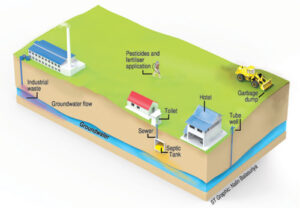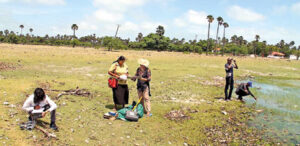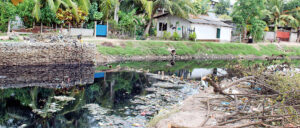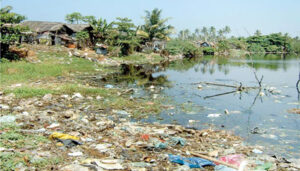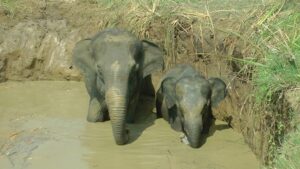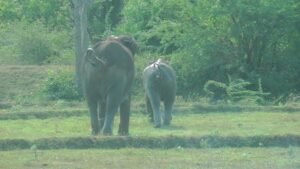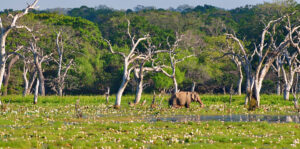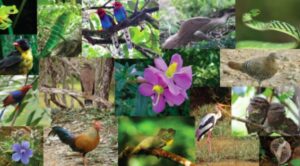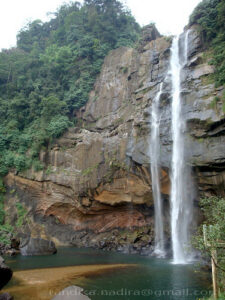
Illegal use of Colombo tube wells endangering people’s health
Colombo’s water table is highly compromised, and using this water via tube wells can lead to the public contracting any number of diseases, and even death, say CMC officials
By Kasun Warakapitiya
Despite warnings from the Colombo Municipal Council (CMC) to refrain from using tube well water obtained in Colombo city, small time hoteliers are said to be secretly making use of ground water.
CMC Chief Medical Officer Dr. Ruwan Wijeyamuni told the Sunday Times that they banned the sinking and use of tube wells within City limits due to the excessive pollution of water. He said that last year the CMC had raided several eateries which used ground water from illicit tube wells.
The CMC is able to detect if ground water is being used by examining the water bills of hotels and restaurants in their annual registration of eateries. “If any eatery is found using ground water, they will not be allowed to operate. We will cancel their licence,” Dr. Wijeyamuni said.
He said that food prepared using tube well water becomes contaminated, while plates washed with such water will, likewise, contaminate the food.
“The Colombo water table is very high up; therefore water can be reached after drilling to a depth of five to ten feet. Colombo is marshy land where water is collected very high in the soil, with little filtration, so it has various contaminants,” he said.
Dr. Wijeyamuni pointed out that in the dry zone, ground water reserves were purer, since they are found at a depth of over forty feet. But in Colombo the water body is polluted by septic leakage and drainage water.
He explained that over a hundred pathogens including types of bacteria, such as E. Coli, were discovered when samples of ground water were tested a few years back. Even discarded battery components including heavy metals such as Lead, Cadmium and Nickel are found in Colombo’s tube well water, as well as unknown viruses, fungi and worms.
“Ingesting polluted water can result in Typhoid fever, Hepatitis, fungal and bacterial infections, poisoning, worm infestations and even death,” Dr. Wijeyamuni cautioned. He added that the Colombo ground water should not be used even for bathing or washing clothes as this can lead to skin rashes, eczema, allergic reactions and eye infections.
CMC Analyst R.M.G.B Rajanayake said that the Colombo water table was contaminated due to industrial and commercial activity. He said that when the water was tested at the CMC laboratory they found Ammonia, Nitrates and Nitric components. The water was heavily mixed with sewage and garbage which had seeped underground.
Mr. Rajanayake pointed out that the water could even contain toxic waste and heavy metals, and therefore people should refrain from using Colombo groundwater.
Source – 21/05/2017, The Sunday Times, See more at – http://www.sundaytimes.lk/170521/news/illegal-use-of-colombo-tube-wells-endangering-peoples-health-240874.html

Simple solutions for a complex problem
Testing pond water on Delft Island (Kumudini Ekaratne © IUCN)
Sharing this meagre amount of freshwater among the world’s populace is not an easy task, and a distressing statistic reveals that one in every nine people in the world does not have access to safe and clean drinking water. Climate change will exacerbate these conditions and it is projected that by 2025, about 1.8 billion people will live in water-scarce areas, and two-thirds of the world’s population will live in water-stressed regions.
Although Sri Lanka is not considered a water-scarce country, there are sharp temporal and spatial variations of water availability within the island. Much of the island lies in the dry zone where, for several months of the year, water is scarce and this is the area from which 90% of water withdrawals are made. In some districts — in the arid zone of Sri Lanka, in Puttalam and Jaffna — for example, the total available water resources are considerably below the recommended levels for a decent quality of life. This situation will only worsen with the combined effect of the predicted impacts of climate change (a reduction in rainfall), a projected increase in Sri Lanka’s population and changing lifestyles needing more water.
Adding to the stark picture are human activities that pollute and poison surface water, and over- abstract ground water. Contamination of ground and surface water through agricultural and industrial pollutants is reported to be the cause of several water-related diseases being reported from the dry zone.
Managing our water resources — controlling the use of water resources to minimise damage to the environment and to maximise efficient beneficial use — has now become critically important in Sri Lanka. As stated by UN Water ‘Water resource management is complex, as it involves managing an uncertain supply to meet increasing and equally uncertain demands, balancing social needs against ecological and economical needs and management across sectors, policies and physical infrastructure.’
Two grant recipients of the Small Grants Facility of Mangroves for the Future (MFF) initiative, implemented by IUCN, took a different approach, looking at two simple elements of water management in Delft Island, where fresh water availability is a major problem. There are no rivers on the island; the ground water aquifer in the island is highly saline; and the island receives a mere 750 mm of sharply seasonal rainfall every year. The major source of freshwater for daily human needs is surface water collected in ponds (depressions on the surface which are filled with runoff water), waterholes and shallowly dug wells. Limited supplies for drinking water are provided intermittently by the Sri Lanka Navy and the National Water Supply and Drainage Board and a reverse osmosis plant (where seawater water is desalinised to make fresh water).
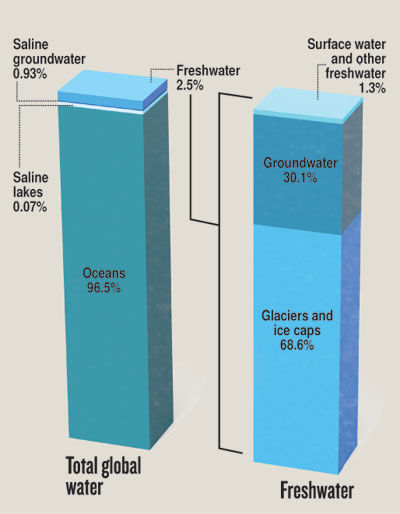
The first grantee — the Jaffna Science Association, Faculty of Science, University of Jaffna Association (JSA), a registered charitable organisation engaged in promoting science among the public — installed a 30,000-litre rainwater harvesting system at Delft MahaVidyalayam, collecting rainwater during the rainy months, instead of letting it runoff, and storing it for later use. To increase awareness about water conservation, they conducted a workshop for 99 middle and upper school students and taught them how to develop and maintain a school garden, using this stored water but managing it carefully, using pot and drip irrigation system for a sand-bag based vegetable garden. (The soil in the school garden is sandy and not suited for cultivation.) Pot irrigation uses clay pots filled with water buried next to growing plants. The porous wall of the clay provides controlled irrigation to the plants and reduces evaporation. Drip irrigation delivers water directly to the roots of plants through a network of rubber hoses. Pot irrigation conserves 50-70% water and drip irrigation, 20-50% water.A hundred clay pots were given with Jambu plants to the students as this species grows well in the dry zone. Students and teachers are now fully engaged in this school gardening activity and are harvesting 15 kg of tomato, 3.5 kg of chilli and 15 kg of aubergine per a week during the harvesting period.These vegetables are now being used to prepare school lunches.
The JSA then expanded their ambit by recruiting 26 beneficiaries from the Sarapittiya village, training them in drip irrigation, and supplying them with vegetable plants.These 26 farmers are now each trained to cultivate 15’ x15’ plots of lands using a water-saving method. They were also trained in vermicomposting, which uses earthworms to hasten natural composting of garden waste for use as fertiliser. All beneficiaries received a vermicomposting unit. Farmers say they have been able to double their income as a result of these changes.
The simple thrusts of these interventions were to teach children and communities to conserve water, initially by collecting what would be wasted, and then by using that collected water sparingly.
The second grantee — the Department of Fisheries at the University of Jaffna identified all ponds/waterholes in Delft Island based and restored a small pond as a model in order to reduce water scarcity among the community in the Delft Island. Firstly, they identified and mapped 37 ponds and 23 water holes, noting that salt water intrusion and sandy soils, combined with high temperature, results in high natural salinity levels. Next, they tested water samples — both in the dry and wet seasons — from 37 ponds and 23 waterholes, for water quality, such as temperature, electrical conductivity (which measures nutrients, salts or impurities in water), total dissolved solids (again, measuring impurities) and dissolved oxygen (a dissolved oxygen level that is too high or too low can harm aquatic life and affect water quality). Water quality — such as salinity, electrical conductivity and dissolved oxygen— in these water bodies increased markedly in the dry season, indicating that they were unsuitable for drinking but could be used for agriculture and for livestock.
As the next step, one pond Thoddichchakulam was restored. Traditionally, associated with the ponds are wells and kerny dug by communities. The latter is dug deeper than ground level, for storing and reserving water for livestock and other animals, while the well is deeper still. During the wet season water collects in the kerny and this water remains during the dry season for livestock, and there is a sloping platform through which the animals access the water.
Researchers from the Department of Fisheries widened the pond, built an earthen ridge to secure it, strengthened and stabilised this ridge by planting Kumbuk/Marudu (Terminalia arjuna) trees on it, cleaned the well and kerny, and raised the wall of the well, preventing pollution during the wet season. Through this physical and ecological restoration, the water storing capacity of the pond doubled. Water in this restored well was tested for heavy metals and found to be free of them.
Again, this grantee’s interventions were simple: to identify the ponds and waterholes, assess the quality of water during dry season and wet season, and to restore a pond as a model to retain more water to be used in the dry season.
Water resource management in Sri Lanka has been dogged by a lack of a unifying water policy, a surfeit of water-related laws and multiplicity of organisations, with a singularly sectoral focus with conflicting legislation, overlapping mandates and ill-defined responsibilities. A paradigm shift in thinking has been called for but the process of developing a unified water management policy remained mired in complexity.
The MFF grantees interventions exemplify Jed Rubenfeld’s (a Yale professor of law) and Robert Collier’s (an American author) combined comments: ‘Don’t try to figure it out all at once’ . . . ‘break the problem into parts, and handle one part at a time.”
This experience in the Island of Delft may also provide insights into water management in many other parts of the country.
Source – 21/05/2017, The sunday times, See more at – http://www.sundaytimes.lk/170521/plus/simple-solutions-for-a-complex-problem-240473.html

Lunawa lagoon –an environmental nightmare
The pristine Lunawa lagoon in Moratuwa -the only lagoon in the Colombo district- is in danger of turning into polluted eyesore with private sector factories as well as railway and bus depots discharging effluents into it.
The biggest culprits are two government institutions –the railway workshop and the SLTB depot at Ratmalana which channel oil waste into the lagoon.
During the colonial era the British installed a cleaning plant to cleanse the waste before releasing it into the lagoon. While the facility is still usable it is not being used.
Environmentalists are concerned that chemical inputs mixed with salt water in the lagoon could destroy living organisms in these waters.
The issue was raised at the Development Committee meeting of Moratuwa this week. Through warnings and threat of litigation, local government authorities feel they have been able to minimise the disposal of waste water and oil into the lagoon, but it is the two state institutions which pose the biggest environmental problem to the lagoon.
Source – 21/05/2017, The Sunday Times, See more at – http://www.sundaytimes.lk/170521/news/lunawa-lagoon-an-environmental-nightmare-240832.html

Two elephants rescued from well in Hambantota
A female elephant and her calf who had fallen into an agricultural well in Bathalayagama, Hambantota have been rescued by officers from the Hambantota Wildlife Range Office.
After being informed of the two trapped elephants he officers used a backhoe to dig a path for the elephants to get out of the well. The operation took over an hour.
Wildlife officers believe that the two elephants had remained trapped inside the well for about two days.
They also said that the trunk of the baby elephant exhibited signs of injury. It is suspected that the elephant had been injured after getting caught in barbed wire in a trap set by hunters.
Story and Pix by Rahul Samantha Hettiarachchi
Source – 18/05/2017,Times Online, see more at – http://www.sundaytimes.lk/article/1022142/two-elephants-rescued-from-well-in-hambantota

Biodiversity and Sustainable Tourism
Biodiversity Sri Lanka will commemorate the International Day of Biological Diversity which falls on 22nd May each year, with an evening session on the UN designated theme for 2017: ‘BIODIVERSITY AND SUSTAINABLE TOURISM’. This session will feature four relevant and illustrative case studies from Sri Lanka and the Asia region presented by Ms Maeve Nightingale of IUCN, Asia, environment and wildlife expert, Dr Sumith Pilapitiya, Mr Madhura de Silva, President, Wildlife Conservation Society, Galle and Mr Ross Sanders, General Manager, Anantara Peace Haven, Tangalle, covering areas such as the significance of the coast around us and carrying capacity and biodiversity issues in our national protected areas. The event will be held on the 22nd of May from 5.00 p.m. to 7.00 p.m. at the Auditorium of the Hatton National Bank, 22nd Floor, HNB Towers, No. 479 T.B. Jayah Mawatha, Colombo 10, and is open to the general public.
Biodiversity, at the level of species and ecosystems, provides an important foundation for many aspects of tourism. Recognition of the great importance to tourism economies of attractive landscapes and a rich biodiversity underpins the political and economic case for biodiversity conservation. A well-managed tourist sector can contribute significantly to reducing threats to, and maintain or increase, key wildlife populations and biodiversity values through tourism revenue. Although Sri Lanka is a small island, its biodiversity is significantly important both in a regional and global scale. The island has been declared as one of the 25 “biodiversity hotspots” of the world. Sri Lanka’s tourism is the country’s third largest foreign exchange earner and contributes a substantial percentage towards the GDP. In post-war Sri Lanka, tourist arrivals have seen a remarkable increase and there is a significant increase in investments in tourism as well as, infrastructure development through opening up of new tourist attractions.
The theme for this year is primarily about ensuring greater control and management to reduce damage to biodiversity from tourism and pursuing the positive contribution of tourism to biodiversity awareness, protected areas, habitat restoration, community engagement, and resource mobilization. This theme therefore provides an opportunity to raise awareness and action towards the important contribution of sustainable tourism both to economic growth and to the conservation and sustainable use of biodiversity.
Biodiversity Sri Lanka (BSL) is an entirely private sector owned and driven not- for-profit platform established to promote strong engagement of the corporate sector in Biodiversity and environmental conservation issues in Sri Lanka. BSL actively promotes strong leadership of the private sector in these areas through active learning, providing technical support, sharing information, knowledge and experience, promoting best practices and dialogue with state and civil society partners. Currently, over 65 leading corporates are members of the Platform.
Source – 18/05/2017,Adaderana Biz, see more at – http://bizenglish.adaderana.lk/biodiversity-and-sustainable-tourism/
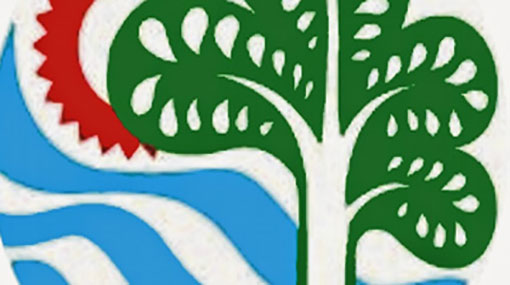
New waste disposal project to be implemented in 7 districts
Novel garbage disposal projects will be implemented in 7 districts, Central Environmental Authority announced.
Deputy Director-General of the Central Environmental Authority, Upali Indarathne stated that by 2020, the projects would be completed in 4 districts.
Upali Indarathne added that in future, a proper method to dispose of waste would be introduced to all the districts across the island in order to combat the rising problem of garbage disposal.
Source – 16/05/2017,Ada Derana, See more at – http://www.adaderana.lk/news/40717/new-waste-disposal-project-to-be-implemented-in-7-districts

Special Committee to look into issues of IDPs and resettled in Mannar district
May 17, Colombo: A special discussion was held at the Presidential Secretariat on Tuesday under the patronage of Secretary to the President Mr. P. B. Abeykoon to look into the issues of the internally displaced persons and the resettled IDPs in the Mannar district.
A group of Muslim representatives and the officials of the Department of Forest Conservation including Secretary to the Ministry of Environment participated in the meeting.
The issues faced by the people in the area, and ways to resolve their issues were discussed in detail at the meeting.
A special gazette notification signed by President Maithripala Sirisena in March on declaring four forests near Wilpattu North Sanctuary as conservation forests has caused serious concern among Muslims and seen as an attempt to prevent Muslims from returning to their lands.
During the meeting it was decided to appoint a Special Committee under the guidance of the President to resolve the issues and decided that the Committee report should be submitted to the President within a month.
Source – 17/05/2017, ColomboPage, See more at – http://www.colombopage.com/archive_17A/May17_1494995140CH.php
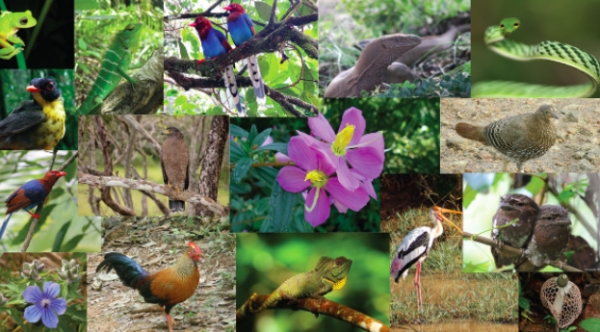
Biodiversity Sri Lanka To Commemorate International Day Of Biological Diversity
Biodiversity Sri Lanka will commemorate the International Day of Biological Diversity which falls on 22nd May each year, with an evening session on the UN designated theme for 2017: ‘Biodiversity and Sustainable Tourism’.
This session will feature four relevant and illustrative case studies from Sri Lanka and the Asia region presented by Maeve Nightingale of IUCN, Asia, environment and wildlife expert, Dr. Sumith Pilapitiya, Madhura de Silva, President, Wildlife Conservation Society, Galle and Ross Sanders, General Manager, Anantara Peace Haven, Tangalle, covering areas such as the significance of the coast around us and carrying capacity and biodiversity issues in our national protected areas.
The event will be held on the 22nd of May from 5.00 p.m. to 7.00 p.m. at the Auditorium of the Hatton National Bank, 22nd Floor, HNB Towers, No. 479 T.B. Jayah Mawatha, Colombo 10, and is open to the general public.
Biodiversity, at the level of species and ecosystems, provides an important foundation for many aspects of tourism. Recognition of the great importance to tourism economies of attractive landscapes and a rich biodiversity underpins the political and economic case for biodiversity conservation. A well-managed tourist sector can contribute significantly to reducing threats to, and maintain or increase, key wildlife populations and biodiversity values through tourism revenue. Although Sri Lanka is a small island, its biodiversity is significantly important both in a regional and global scale. The island has been declared as one of the 25 “biodiversity hotspots” of the world. Sri Lanka’s tourism is the country’s third largest foreign exchange earner and contributes a substantial percentage towards the GDP. In post-war Sri Lanka, tourist arrivals have seen a remarkable increase and there is a significant increase in investments in tourism as well as, infrastructure development through opening up of new tourist attractions.
The theme for this year is primarily about ensuring greater control and management to reduce damage to biodiversity from tourism and pursuing the positive contribution of tourism to biodiversity awareness, protected areas, habitat restoration, community engagement, and resource mobilisation. This theme therefore provides an opportunity to raise awareness and action towards the important contribution of sustainable tourism both to economic growth and to the conservation and sustainable use of biodiversity.
Biodiversity Sri Lanka (BSL) is an entirely private sector owned and driven not- for-profit platform established to promote strong engagement of the corporate sector in Biodiversity and environmental conservation issues in Sri Lanka. BSL actively promotes strong leadership of the private sector in these areas through active learning, providing technical support, sharing information, knowledge and experience, promoting best practices and dialogue with state and civil society partners. Currently, over 65 leading corporates are members of the Platform.
Source – 17/05/2017,Asian Mirror, See more at =- http://www.asianmirror.lk/news/item/23648-biodiversity-sri-lanka-to-commemorate-international-day-of-biological-diversity

Biodiversity Sri Lanka to commemorate International Day of Biological Diversity
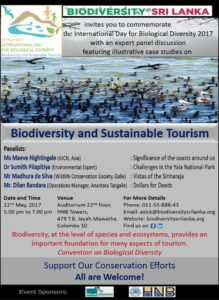 This session will feature four relevant and illustrative case studies from Sri Lanka and the Asia region presented by Maeve Nightingale of IUCN, Asia, environment and wildlife expert, Dr. Sumith Pilapitiya, Madhura de Silva, President, Wildlife Conservation Society, Galle and Ross Sanders, General Manager, Anantara Peace Haven, Tangalle, covering areas such as the significance of the coast around us and carrying capacity and biodiversity issues in our national protected areas.
This session will feature four relevant and illustrative case studies from Sri Lanka and the Asia region presented by Maeve Nightingale of IUCN, Asia, environment and wildlife expert, Dr. Sumith Pilapitiya, Madhura de Silva, President, Wildlife Conservation Society, Galle and Ross Sanders, General Manager, Anantara Peace Haven, Tangalle, covering areas such as the significance of the coast around us and carrying capacity and biodiversity issues in our national protected areas.
The event will be held on the 22nd of May (from 5.00 p.m. to 7.00 p.m.) at the auditorium of the Hatton National Bank, and is open to the general public. Biodiversity, at the level of species and ecosystems, provides an important foundation for many aspects of tourism.
Recognition of the great importance to tourism economies of attractive landscapes and a rich biodiversity underpins the political and economic case for biodiversity conservation.
A well-managed tourism sector can contribute significantly to reducing threats to, and maintain or increase, key wildlife populations and biodiversity values through tourism revenue. Although Sri Lanka is a small island, its biodiversity is significantly important both in a regional and global scale.
The island has been declared as one of the 25 ‘biodiversity hotspots’ of the world. Sri Lanka’s tourism is the country’s third largest foreign exchange earner and contributes a substantial percentage towards the GDP.
In post-war Sri Lanka, tourist arrivals have seen a remarkable increase and there is a significant increase in investments in tourism as well as, infrastructure development through opening up of new tourist attractions.
The theme for this year is primarily about ensuring greater control and management to reduce damage to biodiversity from tourism and pursuing the positive contribution of tourism to biodiversity awareness, protected areas, habitat restoration, community engagement, and resource mobilization.
This theme therefore provides an opportunity to raise awareness and action towards the important contribution of sustainable tourism both to economic growth and to the conservation and sustainable use of biodiversity.
Biodiversity Sri Lanka (BSL) is an entirely private sector owned and driven not-for-profit platform established to promote strong engagement of the corporate sector in biodiversity and environmental conservation issues in Sri Lanka.
BSL actively promotes strong leadership of the private sector in these areas through active learning, providing technical support, sharing information, knowledge and experience, promoting best practices and dialogue with state and civil society partners. Currently, over 65 leading corporates are members of the platform.
Source – 17/05/2017,Dailymirror- See more at: http://www.dailymirror.lk/article/Biodiversity-Sri-Lanka-to-commemorate-International-Day-of-Biological-Diversity-129069.html#sthash.mY12rH8S.dpuf
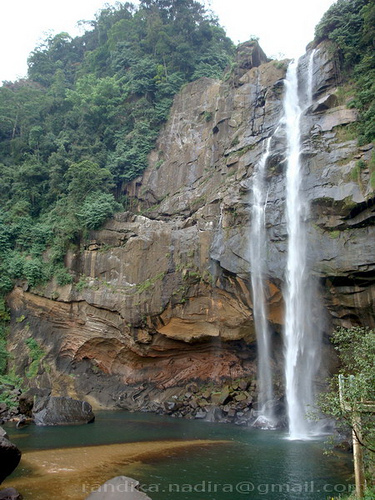
Aberdeen Falls
The Aberdeen Falls in Ginigathhena will be developed as a tourism promotion project, Ambagamuwa Pradeshiya Sabha Secretary S.Sarawanabhavan said. This picturesque waterfall was previously known as ‘Eladona Falls’ but had been named ‘Aberdeen’ by the British later on. The waterfall is 320 feet in height and is the main source of water supply to the Castlereigh Reservoir.
Source – 15/05/2017,Dailymirror- See more at: http://www.dailymirror.lk/article/Aberdeen-Falls-128921.html#sthash.XA0MntY1.dpuf

